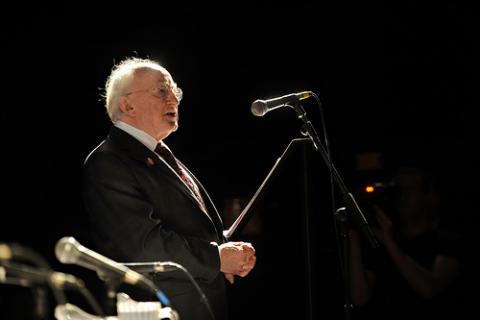Michael D's brilliant parting shot

By some stroke of good luck we have a remarkable man as our president. We probably don't deserve him. By Vincent Browne.
The Dáil met on the afternoon of Tuesday, 26 January last and debated the second reading of the Finance Bill. There was a spat about speaking rights and the opening speech was made by Brian Lenihan, who went on to defend the Universal Social Charge and went through the changes which the new Finance Bill was to inaugurate.
He was followed by Michael Noonan, who proposed the House decline a second reading of the Finance Bill on the grounds it contained virtually no proposals to encourage economic growth and job creation and that the Bill would have a severe impact on the most vulnerable in society. Joan Burton spoke in a similar vein. Then there was Eamon Ryan and Pearse Doherty, followed by the usual suspects, many of them speaking in the Dáil for the last time.
Several hours into the debate, Noel Ahern joined in. He said having looked around the Dáil chamber a minute or two earlier he noted: “What a motley crew was present”. He went on for a bit and was succeeded by Michael D Higgins.
Michael D then delivered a speech which I think will be recognised as one of the great speeches the Dáil has heard, or perhaps, more accurately, that the motley crew then in the Dáil chamber heard.
He began by noting he had been in the Dáil for 25 years, with nine years in the Seanad. He said he was indebted not just for the courtesy of members of the House, the staff and ushers and others, but also on occasion for their kindness as well.
He said no real republic had been created in Ireland: “I think those who wanted Ireland to be independent would have envisaged a country in which there would be far greater distribution of power, that it would not be confined solely to the exercise of parliamentary democracy.”
He said there was more to political power than voting once every four or five years; there was the exercise of power in every dimension of life. If one wanted to effect radical change, one would break the connection between the monopoly enjoyed by the government of the day and parliament.
He said there was a kind of artificial connection between what was moral and what was ethical, which was incredibly dangerous. It was widening an excluded underclass in Ireland. It was creating people who would move quickly to conflict because there were no mediating institutions in Europe.
“Instead of speaking about the republic that might be created, people spoke about getting a bit of the action. Suddenly it was no longer important to have just one house for shelter or to have another for pension purposes, in case a family split up or somebody retired. One needed a string of houses, and thus our property bubble was created within a bubble of speculative capitalism.
“One would make it possible that children share the same class and for that period of their lives at least would be able to be equal with regard to education. In addition to this, people would have decent housing.”
In a critique of the ideology of nationalism, he said: “When the egalitarian socialist agenda was placed side by side with the nationalist agenda it would be the socialist agenda which would lose. This was in the dialogue immediately before the meeting of the first Dáil when Michael Collins told the IRB it need not bother with this because they were just going through with it.
“A highly participative, inclusive republic was the one in the vision of those who made the case for Irish independence at the end of the 19th century and the beginning of the 20th century. It was this which was stolen from the people after the foundation of the State when the conservatives marched into all the principal professorships, including education and philosophy. UCD became a stable for conservatism and suddenly one had the continuation of an administrative nightmare and the robbing of the people of the delivery of the republic with regard to their ordinary lives.”
Two Fianna Fáil TDs in the chamber, Michael Moynihan and Timmy Dooley, who spoke after Michael D, acknowledged the remarkable speech to which they had been witness. Dooley said it had been a privilege to have been in the chamber to hear Michael D deliver his final oration as a TD. Michael Moynihan cavilled a little at Michael D’s critique of clientelism and back-slapping. He said when John F Kennedy visited Galway in the early 1960s, a man in the crowd handed the American president an envelope with a query about his American Legion pension, to which the president later replied. As for back-slapping, Benedict XVI “stood at the door and shook the hands and clapped the backs of each of the cardinals going into the conclave, which shows the importance of personal contact in that regard. If it is good enough to elect the pope, we should be proud of the system we have here.”
By a freak of circumstance, we have a splendid man as our new President. In truth, we don’t deserve him. The other fellow probably more truly reflected the mores and spirit of our times.
Image top: The Labour Party.
